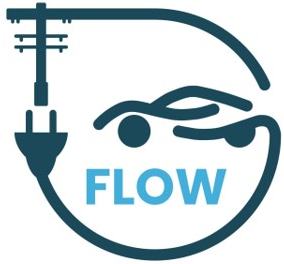 FLOW is an Horizon Europe project. FLOW boosts and demonstrates multifaceted Electric
Vehicle (EV) smart charging and Vehile-to-Everything (V2X) integration into energy systems thanks to a range of comprehensive solutions providing answers to
the needs of all actors involved. These solutions include highly replicable user-centric products, concepts, configurations and mechanisms to optimize the
operations. Cross-sector harmonization and standardization is delivered to facilitate activities of stakeholders and EV users. Advanced interoperable solutions
enhance planning, operation and assessment of EV charging for seamless integration into the energy system and identification of the most appropriate scenario based
on a multi-criteria model, leveraging appropriate business models and tailored services. FLOW also delivers multi-actor orchestration to ensure data exchange and
synchronisation across actors for Vehicle-Grid-Integration (VGI) and EV flexibility services. Within the project, my role was that of leader from RSE's
Department side (T4.3 leader).
FLOW is an Horizon Europe project. FLOW boosts and demonstrates multifaceted Electric
Vehicle (EV) smart charging and Vehile-to-Everything (V2X) integration into energy systems thanks to a range of comprehensive solutions providing answers to
the needs of all actors involved. These solutions include highly replicable user-centric products, concepts, configurations and mechanisms to optimize the
operations. Cross-sector harmonization and standardization is delivered to facilitate activities of stakeholders and EV users. Advanced interoperable solutions
enhance planning, operation and assessment of EV charging for seamless integration into the energy system and identification of the most appropriate scenario based
on a multi-criteria model, leveraging appropriate business models and tailored services. FLOW also delivers multi-actor orchestration to ensure data exchange and
synchronisation across actors for Vehicle-Grid-Integration (VGI) and EV flexibility services. Within the project, my role was that of leader from RSE's
Department side (T4.3 leader).
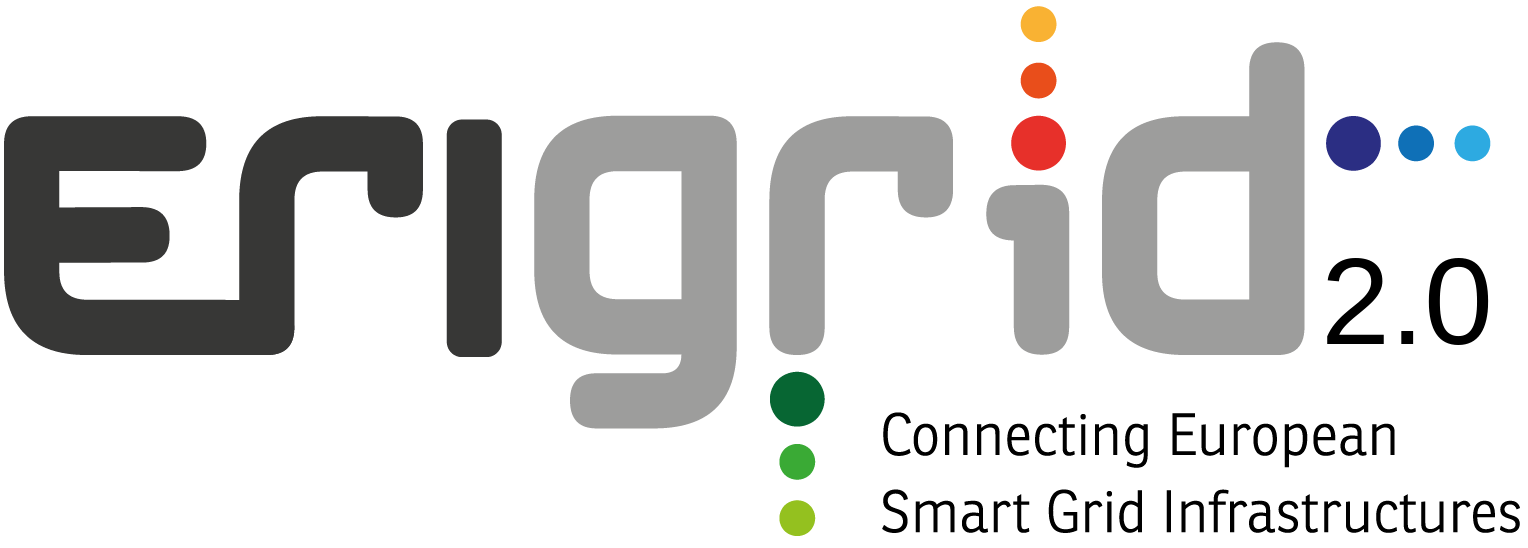 ERIGrid2 is an Horizon 2020 INFRAIA project. Based on the results from the
ERIGrid-1 project, the successor project ERIGrid 2.0 expanses the research services
and tools of European research infrastructures for validating smart energy networks with the electric power grid as the main backbone.
Committed to the holistic and cyber-physical systems-based validation approach, ERIGrid 2.0 fosters system-level support and education
for industrial and academic researchers in power and energy systems research and technology development. Within the project, my role
was that of work package leader (WP13 - JRA4).
ERIGrid2 is an Horizon 2020 INFRAIA project. Based on the results from the
ERIGrid-1 project, the successor project ERIGrid 2.0 expanses the research services
and tools of European research infrastructures for validating smart energy networks with the electric power grid as the main backbone.
Committed to the holistic and cyber-physical systems-based validation approach, ERIGrid 2.0 fosters system-level support and education
for industrial and academic researchers in power and energy systems research and technology development. Within the project, my role
was that of work package leader (WP13 - JRA4).
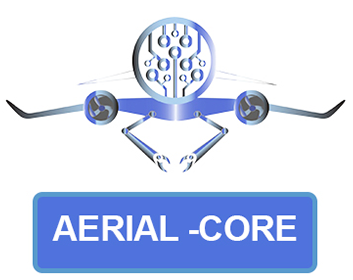 Aerial-Core is an ICT project. It aims to develop core technology
modules and an integrated aerial cognitive robotic system that will have unprecedented capabilities on the operational range and safety
in the interaction with people, or Aerial Co-Workers (ACWs) for applications such as the inspection and maintenance of large linear
infrastructures. The system will integrate aerial robots with different characteristics and will be able to meet the requirements of:
(1) Long range (several kilometres) and local very accurate (subcentimetre) inspection of the infrastructure, (2) maintenance activities
based on aerial manipulation involving force interactions, and (3) aerial co-working safely and efficiently helping human workers in
inspection and maintenance. Within the project, my role was that of leader from CTU side (June 2020 - July 2022, T2.3 and T7.4 leader)
and participant (July 2022 - December 2023).
Aerial-Core is an ICT project. It aims to develop core technology
modules and an integrated aerial cognitive robotic system that will have unprecedented capabilities on the operational range and safety
in the interaction with people, or Aerial Co-Workers (ACWs) for applications such as the inspection and maintenance of large linear
infrastructures. The system will integrate aerial robots with different characteristics and will be able to meet the requirements of:
(1) Long range (several kilometres) and local very accurate (subcentimetre) inspection of the infrastructure, (2) maintenance activities
based on aerial manipulation involving force interactions, and (3) aerial co-working safely and efficiently helping human workers in
inspection and maintenance. Within the project, my role was that of leader from CTU side (June 2020 - July 2022, T2.3 and T7.4 leader)
and participant (July 2022 - December 2023).
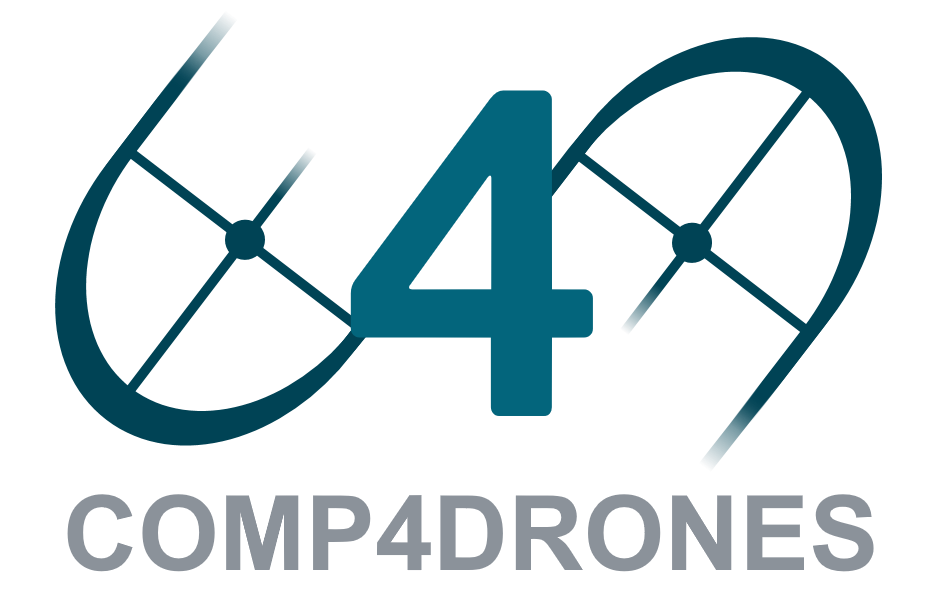 Comp4Drones is an ECSEL JU project with the aim of providing a framework of key enabling
technologies for safe and autonomous drones. It brings to bear a holistically designed ecosystem from application to electronic components, realized as a
tightly integrated multi-vendor and compositional UAV embedded architecture solution and a tool chain complementing the compositional architecture principles.
The ecosystem aims at supporting (1) efficient customization and incremental assurance of drone embedded platforms, (2) safe autonomous decision making concerning
individual or cooperative missions, (3) trustworthy drone-to-drone and drone-to-ground communications even in presence of malicious attackers and under the
intrinsic platform constraints, and (4) agile and cost-effective compositional design and assurance of drone modules and systems. Within the project,
my role was that of participant.
Comp4Drones is an ECSEL JU project with the aim of providing a framework of key enabling
technologies for safe and autonomous drones. It brings to bear a holistically designed ecosystem from application to electronic components, realized as a
tightly integrated multi-vendor and compositional UAV embedded architecture solution and a tool chain complementing the compositional architecture principles.
The ecosystem aims at supporting (1) efficient customization and incremental assurance of drone embedded platforms, (2) safe autonomous decision making concerning
individual or cooperative missions, (3) trustworthy drone-to-drone and drone-to-ground communications even in presence of malicious attackers and under the
intrinsic platform constraints, and (4) agile and cost-effective compositional design and assurance of drone modules and systems. Within the project,
my role was that of participant.
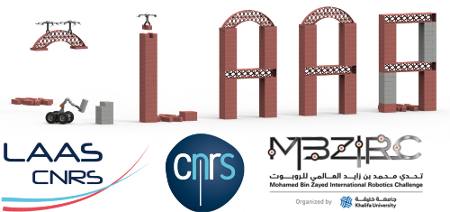 The Mohamed Bin Zayed International Robotic Challenge (MBZIRC) is a biennial international
robotics competition that provides an ambitious and technologically demanding set of challenges and is open to all teams from all countries. Also, the MBZIRC
competition aims to inspire future robotics through innovative solutions and technological excellence. Within the competition, specifically the “challenge 2”,
autonomous aerial and ground robots have been carried out for navigation and manipulation tasks, in unstructured, outdoor and indoor environments. In particular,
a team of UAVs (Unmanned Aerial Vehicles) and a UGV (Unmanned Ground Vehicle) collaborating to autonomously locate, pick, transport and assemble different types
of brick shaped objects to build pre-defined structures, in an outdoor environment. Those challenge is motivated by construction automation and autonomous robot
based 3D printing of large structures. Within the competition, my role was that of participant. More information about the challenges, the partecipants
and the achivied results can be found at http://mbzirc2020team.laas.fr/.
The Mohamed Bin Zayed International Robotic Challenge (MBZIRC) is a biennial international
robotics competition that provides an ambitious and technologically demanding set of challenges and is open to all teams from all countries. Also, the MBZIRC
competition aims to inspire future robotics through innovative solutions and technological excellence. Within the competition, specifically the “challenge 2”,
autonomous aerial and ground robots have been carried out for navigation and manipulation tasks, in unstructured, outdoor and indoor environments. In particular,
a team of UAVs (Unmanned Aerial Vehicles) and a UGV (Unmanned Ground Vehicle) collaborating to autonomously locate, pick, transport and assemble different types
of brick shaped objects to build pre-defined structures, in an outdoor environment. Those challenge is motivated by construction automation and autonomous robot
based 3D printing of large structures. Within the competition, my role was that of participant. More information about the challenges, the partecipants
and the achivied results can be found at http://mbzirc2020team.laas.fr/.
 AFarCloud is an ECSEL JU project with the aim of providing a distributed platform for autonomous
farming that will allow the integration and cooperation of agriculture Cyber Physical Systems in real-time in order to increase efficiency, productivity, animal
health, food quality and reduce farm labour costs. This platform will be integrated with farm management software and will support monitoring and decision-making
solutions based on big data and real time data mining techniques. The AFarCloud project also aims to make farming robots accessible to more users by enabling farming
vehicles to work in a cooperative mesh, thus opening up new applications and ensuring re-usability, as heterogeneous standard vehicles can combine their capabilities
in order to lift farmer revenue and reduce labour costs. Within the project, my role was that of leader from UniSannio side (T3.2 leader).
AFarCloud is an ECSEL JU project with the aim of providing a distributed platform for autonomous
farming that will allow the integration and cooperation of agriculture Cyber Physical Systems in real-time in order to increase efficiency, productivity, animal
health, food quality and reduce farm labour costs. This platform will be integrated with farm management software and will support monitoring and decision-making
solutions based on big data and real time data mining techniques. The AFarCloud project also aims to make farming robots accessible to more users by enabling farming
vehicles to work in a cooperative mesh, thus opening up new applications and ensuring re-usability, as heterogeneous standard vehicles can combine their capabilities
in order to lift farmer revenue and reduce labour costs. Within the project, my role was that of leader from UniSannio side (T3.2 leader).
![]() LinkedIn
·
GitHub
·
Gist
·
LinkedIn
·
GitHub
·
Gist
·
![]() Google Scholar
·
Google Scholar
·
![]() Researchgate
·
YouTube
·
Researchgate
·
YouTube
·
![]() ORCID
·
ORCID
·
![]() Scopus
·
Scopus
·
![]() WebOfScience
WebOfScience
© Giuseppe Silano. Built with Jekyll and Bootstrap. Based on a design by Alexander W. Winkler.